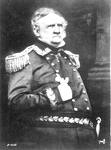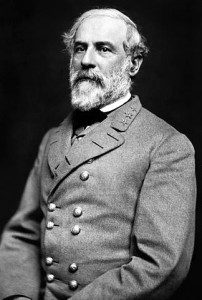Will Robert E. Lee Be Loyal To The United States Or To Virginia?
Robert E. Lee was born on January 19, 1807, at Stratford in Westmoreland County, Virginia and he spent his youth and adulthood in Northern Virginia. The Lee family roots run deep into the early history of the United States and Virginia. When the Civil War begins, Robert E. Lee will have to decide between giving his loyalty to the state of Virginia, or to the United States of America.
Winfield Scott Recommends Robert E. Lee For United States Army Command
Winfield Scott’s long military career was a distinguished one. Scott served the United States in the War of 1812 and in the Mexican-American War, at the beginning of the Civil War, he was general-in-chief of the United States Army. By the time of the Civil War, General Winfield Scott was not the strong and healthy physical specimen he once was. He was now in his mid-seventies and he was unable to lift himself up onto a horse. Although his mind remained sharp, his physical condition meant Scott’s days of field command were behind him.Winfield Scott knew the Civil War would be a long and difficult conflict that would require more time, men, and resources than was generally believed. General Scott understood it would take a time to raise and train an army before it could be effective in the field. He knew that a plan must be in place for the conduct of the war. Scott developed the Anaconda Plan which included blockading the coast, gaining control of the Mississippi River, take military power into the South. Scott’s plan was a good one and it is basically how the United States fought the Civil War. General Scott also knew the army would need a commander. After Abraham Lincoln’s election, secession fever was in the air as Southern states began steadily seceding from the Union. Scott made a recommendation to Lincoln in April 1861, that Colonel Robert E. Lee of Virginia be made field commander of the new and now forming Union Army outside of Washington. Southern states had seceded from the Union, but Virginia had not left the Union at this time.
The eleven states of the Confederacy listed in the order of their secession from the Union:
- 1. South Carolina – December 20, 1860
- 2. Mississippi – January 9, 1861
- 3. Florida – January 10, 1861
- 4. Alabama – January 11, 1861
- 5. Georgia– January 19, 1861
- 6. Louisiana – January 26, 1861
- 7. Texas – February 1, 1861
- 8. Virginia – April 17, 1861
- 9. Arkansas – May 6, 1861
- 10. North Carolina – May 20, 1861
- 11. Tennessee – June 8, 1861
Virginia Secedes And Robert E. Lee Chooses Virginia Over The United States
Lieutenant Colonel Robert E. Lee was stationed in Texas when it seceded on February 1. Lee received orders from Lieutenant General Winfield Scott to report to him in Washington. On March 1, 1861, Lee arrived at his family home of Arlington, located just across the Potomac River from Washington.Robert E. Lee served under Winfield Scott during the Mexican War and Scott held Lee in high regard. Scott once said of Lee, “the very finest soldier I’ve ever seen.” Winfield Scott was a Virginian, he wanted his fellow Virginian to stay loyal to the United States and to remain in the United States Army. On March 16, Robert E. Lee was promoted to Colonel of the First United States Cavalry. Although Lieutenant General Winfield Scott could not technically offer Lee the command of United States forces in Washington (that was up to Secretary of War Simon Cameron), discussions between Winfield Scott and Robert E. Lee began that early March. Scott was almost certainly urging Lee to remain loyal and to accept command of the United States Army.
Fort Sumter was lost for the Union when it was surrendered on April 13 and then evacuated on April 14. Virginia seceded from the Union on April 17, 1861 (See: Virginia Ordinance Of Secession). On April 18, Robert E. Lee was requested to meet separately with Winfield Scott and Francis Preston Blair. Blair was a journalist and newspaper editor with significant political influence. Blair later said the reason he met with Lee was, “In the beginning of the war Secretary Cameron asked me to sound General Robert E. Lee, to know whether his feelings would justify him in taking command of our army.” During Blair’s meeting with Lee (which was through President Abraham Lincoln and Secretary of War Simon Cameron), Blair offered command of the Federal forces outside of Washington to Robert E. Lee with the goal of suppressing the rebellion.
The question challenging Robert E. Lee was whether he would remain loyal to the United States of America, or would he pledge his loyalty to the state of Virginia, with loyalty to the Confederate States of America to follow. It was not an easy question for Lee to answer.
Robert E. Lee’s roots in the United States of America and its army were deep. Lee was a West Point graduate, he’d ranked second in his West Point 1829 class, he was an officer in the United States Army holding the rank of lieutenant colonel, he’d been Superintendent of West Point, and his father was Henry “Light Horse Harry” Lee III who was a Revolutionary War officer, “Light Horse Harry” had given George Washington’s eulogy. But foremost, Robert E. Lee was a Virginian. Lee’s loyalty was to the slave state of Virginia.
Robert E. Lee declined the offer to become the commander of the Federal armies. Early on April 20, 1861, Robert E. Lee resigned from the United States Army with a letter to Secretary of War Simon Cameron. Later the same day, he sent another resignation letter to General-in-Chief Winfield Scott.
Robert E. Lee’s Resignation Letter From The United States Army To Simon Cameron
Robert E. Lee resigns his Commission of Colonel of the 1st Regiment of Cavalry in the United States Army
20 April 1861
Honble Simon Cameron
Sect. of War
Sir,
I have the honor to tender the resignation of my Commission of Colonel of the 1st Regt. of Cavalry.
Very respectfully your Ob’t servant
R. E. Lee
Col 1st. Cavalry
Robert E. Lee’s Resignation Letter From The United States Army To Winfield Scott
April 20, 1861
Robert E. Lee
General:
Since my interview with you on the 18th instant I have felt that I ought not longer to retain my commission in the Army. I therefore tender my resignation, which I request you will recommend for acceptance.
It would have been presented at once, but for the struggle it has cost me to separate myself from a service to which I have devoted all the best years of my life & all the ability I possessed.
During the whole of that time, more than 30 years, I have experienced nothing but kindness from my superiors, & the most cordial friendship from my companions. To no one Genl have I been as much indebted as to yourself for uniform kindness & consideration, & it has always been my ardent desire to merit your approbation.
I shall carry with me to the grave the most grateful recollections of your kind consideration, & your name & fame will always be dear to me. Save in the defence of my native State, I never desire again to draw my sword.
Be pleased to accept my most earnest wishes for the continuance of your happiness & prosperity & believe me most truly yours
R. E. Lee
Robert E. Lee Takes Command Of The Virginia State Forces
On April 25, the War Department had processed Robert E. Lee’s resignation, making it official. Lee was then summoned to Richmond where he met with Virginia’s Governor John Letcher. Letcher offered Lee a major generalship to take command of the Virginia State Forces. Lee accepted this offer. Brigadier General Irvin McDowell gained the command of the United States troops in Washington.


